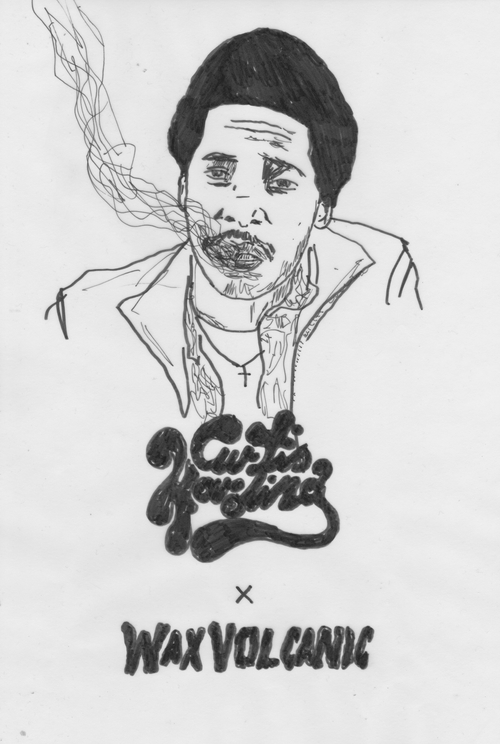
JUST A PART OF ME
A Conversation with Curtis Harding
Curtis Harding is missing. Or at very least he’s missing in the only non-aeronautical way it’s still possible to be missing on Earth in 2015—he’s not picking up his phone. Or just doesn’t want to, impossible to tell. If I could potentially be reclined in a bar in Atlanta, Georgia, spinning gospel records with the Black Lips or in the process of being shot in smoky black and white for Saint Laurent, surrounded by waifish models in inexplicable states of undress, I’d probably let my press schedule slip too.
“We’re still having trouble getting through to Curtis, do you want to hold or should I call you back?” rasps the operator’s voice (for the second 10am Friday appointment in a row).
It’s a call back, obviously.
[Author’s Note: There’s something about hold music that seems intentionally oppressive. I’m believing less and less that it’s high-quality music (classical chamber, quartet or solo) that has been wrung through low-quality technologically. I’m starting to believe that, given the fact that we are in 2015 where it’s almost impossible (see above) to get lost and becoming entirely possible to send leisure rockets into space, it must be deliberate. Hold music must surely be made like this, a mild telephonic weapon, prompting phones back to cradles and away from ears to free up phone lines on government welfare and insurance claim lines worldwide. I guess in this case it could just be a bad connection. Maybe.]
With phone laid down I start fumbling with the crude science of coffee which functions malleably as a sort of glue between the tasks of the day. I’m housesitting for a friend and all three mugs in front of me are Dr Who themed. One features Tom Baker (the Fourth Doctor) with hand raised and a Dalek and H-9 the robot dog to his left. The second is all Daleks and EXTERMINATE printed above in full caps. The third (and chosen) mug features Peter Davison (the fifth Doctor) and a quote: “A man is the sum of his memories you know…a TIME LORD even more so.”
The phone rings again.
Curtis Harding affirms (and reaffirms) in a drawl like leaking molasses, the sentiments of the fifth Time Lord.
“You don’t really think of songs individually when you’re writing them,” he says of writing his debut record Soul Power, “they’re all like your children, you know. They’re a part of you.”
‘A part of you’ is a phrase Harding uses multiple times during our conversation, and is unwaveringly sincere each time. And song-to-children comparisons aside, it stands to reason. Some of the songs on Soul Power he cites as being almost a decade old, the love of his songs and of his craft having very much endured the weather of time and miles under his various heels.
Soul Power is one of those rare albums that feels almost possessed, electrified with the ability to make the listener both dance and weep (in even measure and often simultaneously.)
[Author’s Note: Moments of particular weeping/dancing synchronicity are during ‘Surf’, ‘Heaven’s on the Other Side’ and lead single ‘Next Time’ which manages not only an emotional and choreographic register but also (somehow) a sexual register. This third tone, while occasionally clearing, hangs like a low fog over the majority of the album, and is generally so dense; you almost forget it’s there. Almost.]
But in any case, the crying/dancing coexistence on Soul Power, I submit, is temporal in basis. It’s the mingling of the past—the swaying, jangling soul of the album—with the newer, grimier present and meeting it right in the middle. Soul Power traps the wealth of associations with vintage soul and rock and roll that people have gleaned or have been donated via decades of film, advertising and literature, and are dragging with them—and drags them all the way into 2015. Like looking at the world through a grimy mid-60s Chevrolet window. This regluing of past to present speaks unconsciously to all of those associations (both politically solemn and musically rapturous) with soul music, while preserving the catharsis of its rhythm and (this is the true crux of the whole crying/dancing phenomenon) —not addressing the past as a kind of pastiche or window dressing and so making real, sensate, all the gravity and levity of soul music’s truest intentions. It ends up being deeply soothing, a kind of relief. But Harding shrugs off any claim of his sound possessing any kind of considered nature, saying “it’s just how it came out” and what makes his work on Soul Power so immediate and (for lack of a less nebulous term) ‘real’ is that he “[has] a love for it and you can hear that love come out in the music…”

But whether deeply considered or steeped unconsciously over time in his experience, a man is, as the Timelord’s saying goes, the sum of his memories, and Harding, in his mid-thirties after a life of ups and downs, has a lot to draw from. One such trough was his involvement in a soul group from Atlanta called the Constellations, a group that Harding drifted away from on the eve of their signing to Virgin records and who have continued to cultivate a more reliable swathe of pastiche over the surface of the soul genre. Harding was, in his own words, “always going in another direction.”
But this is where the Curtis Harding story gets truly interesting, or at least complexly and unsexily real. Where the story almost ceases to become one. In the carefully preadjusted and endlessly recombed LA film script version of this story this is where it gets truly dark, where Harding finds himself working behind bars in Atlanta and finally in the inky stomach of some existential abyss, finds the fuel for the music that will finally redeem him. But it turns out that this is just a story.
“No I just didn’t wanna keep going form the street to the club I just wanted to be a normal person, working a normal job. I was doing what I wanted to do…”
Harding isn’t content to sit down and feed himself so wholly into the same narrative that is popularly associated with blues and soul music at the expense of his own place musically and historically. He plays music informed by struggle, but without manufacturing it, free from any sense of counterfeit.
[Author’s Note: Feel compelled to reiterate for the sake of crystalline clarity: I’m not at all suggesting that the rich and gravid social history tethered to particular strains of popular music is ‘done’ or a ‘tired narrative’ etc. Heck, no. I’m interested directly in the creative currency generated by artists who slide themselves into a pre-existing archetype and replicate verbatim the same stories that have previously unfolded at the expense of their own identity, the musical relevance of the genre and clocks and calendars everywhere.]

And again the intricate regluing of past to present persists in Curtis Harding’s impossibly elastic instant. Harding grew up on gospel, a singer and multi-instrumentalist whose first audiences were in front of church congregations. But his musical pedigree past became inextricable from his musical future when he heard gospel ringing through an Atlanta bar one night. He approached the guy playing the record—it was Cole Alexander, gospel fan and singer/guitarist in punk rock band The Black Lips. They became fast friends, collaborating together as Night Sun and most recently on ‘I Don’t Wanna Go Home’, a song which appears with slightly different arrangements on both Harding’s Soul Power and the Black Lips’ Underneath the Rainbow.
“Yeah me and Jared [Swilley] and Cole wrote that. We just decided to write a song and put it out, so that’s what happened. They liked it so much they put it on their record too…” There’s an unmistakeable rock and roll grit to Harding’s overheated soul. And then to meet the Black Lips [Author’s Note: Not to mention the other Atlanta native Cee-Lo Green who Harding was introduced to, and then became a backup singer for, some time before his solo career took off.] and begin making what he calls “Slop and Soul”, which is his way of saying “a little bit of everything.” There’s so much of Atlanta infused in Soul Power, I can’t help but wonder aloud if it could have been produced anywhere else. Harding quietly disagrees.
“I wouldn’t say it was Atlanta, it was just a part of me. It would have come out some time. Just so happened it came out in Atlanta, Georgia. It’s not just a soul crowd or a punk rock crowd or psych or garage, and that’s what music is for; it brings people together, not separates them…”
Curtis Harding is missing. He’s missing in the most relevant way an artist can be missing in 2015, by not seeking a fidelity to the parables that see the same stories told and retold ad infinitum As artists try and capture the essence of a powerful association, they starve themselves (and their audience) from the chance at something new. Curtis Harding is trying something different. While borrowing heavily from a musical culture he’s grown with, he doesn’t need to slot himself straight into their story. He’s a misfit, just as much the soul singer on Burger Records hanging out with the punk rock kids as he is a punk rock kid hanging in the creative ambit of the soul crowd.
“I don’t know if I fit in anywhere man” Harding confides almost wistfully. “And I’m okay with that. I enjoy creating a new lane.”

Curtis Harding’s Soul Power is available now where all good records are sold | streamed.




